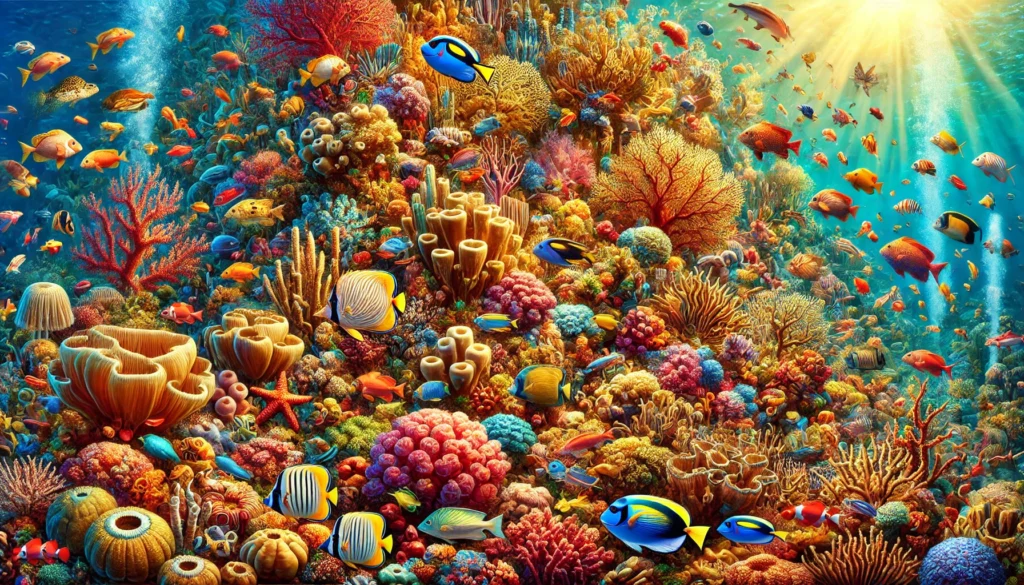Fun Fact: Did you know the oceans absorb about 90% of the excess heat generated by human activities?
When we think of climate regulation, the first images that come to mind might be trees, plants, and the air we breathe. But there’s a powerful climate hero that often gets overlooked – our oceans. Covering over 70% of the Earth’s surface, oceans are a dynamic force in maintaining the planet’s climate balance. Today, we’ll dive into how oceans regulate climate, why this matters, and what happens if their delicate balance is disrupted.
The Oceans as Giant Heat Absorbers
One of the most critical roles oceans play in climate regulation is their ability to absorb and store heat. Oceans act as a global thermostat, balancing heat across the planet and preventing extreme temperatures. Because water holds heat longer than land, oceans stabilize the global temperature, making life possible on Earth. In fact, scientists estimate that oceans have absorbed over 90% of the additional heat trapped in our atmosphere due to greenhouse gases.
This ability to absorb heat isn’t just theoretical; it’s saving us from immediate extreme climate swings. For example, without oceans, our summers would be much hotter and winters significantly colder, creating an environment unsuitable for much of our current life on land.
Carbon Dioxide (CO₂) Storage
Oceans are also major carbon sinks, absorbing nearly 30% of human-produced CO₂. This process is crucial because CO₂ is a greenhouse gas that traps heat in the atmosphere, driving global warming. When the oceans absorb CO₂, they help offset some of this warming effect. However, this carbon-absorbing superpower has its limits, as high levels of CO₂ lead to ocean acidification, which harms marine life, especially corals and shell-forming organisms.
Take the Great Barrier Reef as a case study. Due to excessive CO₂ absorption, the reef suffers from bleaching and deterioration, threatening an entire ecosystem that supports millions of marine species and has cascading effects on global biodiversity.

Currents and Climate: The Role of Ocean Circulation
The oceans don’t just passively absorb heat; they also actively distribute it through currents. These currents act like conveyor belts, moving warm water from the equator to the poles and returning cold water back down. The Gulf Stream, for instance, moves warm water from the Gulf of Mexico toward Europe, making European winters much milder than areas at similar latitudes.
One of the most significant and mysterious systems of ocean circulation is the Atlantic Meridional Overturning Circulation (AMOC), which includes the Gulf Stream. If AMOC were to slow down or stop – as some scientists worry could happen due to melting Arctic ice – Europe could face colder temperatures, while other regions could experience more intense weather patterns.
Case Study: The Warming Arctic and Slowing Currents
Arctic ice melt has increased, adding freshwater to the ocean and potentially disrupting currents. These shifts could alter weather patterns and climate stability across the globe. Some experts compare this to turning down the thermostat on the entire northern hemisphere, which could lead to severe winters in North America and Europe and unpredictable weather elsewhere.
Marine Life and Climate Balance: The Importance of Biodiversity
Healthy oceans are essential for maintaining climate stability, partly due to marine organisms that contribute to carbon cycling. Phytoplankton, tiny organisms that float near the ocean surface, absorb CO₂ and release oxygen through photosynthesis, much like trees. In fact, phytoplankton produce over half of the world’s oxygen and play a role in drawing down carbon from the atmosphere.
Coral reefs, often called the “rainforests of the sea,” are another essential element. By building calcium carbonate structures, corals contribute to long-term carbon storage. However, with warming waters and ocean acidification, corals face bleaching and mass die-offs, which can lead to further destabilization of oceanic carbon storage.
Anecdote: The Case of the Hawaiian Coral Reefs
The Hawaiian coral reefs experienced severe bleaching in recent years, and with this, Hawaii has observed a shift in fish populations, affecting local fishing communities. This is not just an environmental crisis; it impacts livelihoods and the entire marine food chain.
Oceans and Weather Patterns: Influencing Storms and Rainfall
Oceans influence rainfall, droughts, and storms through complex interactions with the atmosphere. Warmer oceans provide more energy for storms, which is why we see more intense hurricanes and typhoons during certain seasons. Warm waters fuel storms, creating conditions where hurricanes can rapidly intensify, posing greater risks to coastal areas.
For example, during El Niño events, warm water accumulates in the Pacific Ocean, leading to drier conditions in Southeast Asia and wetter conditions in South America. This shift affects agriculture, water supplies, and wildlife, with economic impacts in many parts of the world.
What Happens if We Don’t Protect Our Oceans?
As climate change progresses, oceans face unprecedented threats, from rising temperatures and acidification to pollution and overfishing. The consequences are not just environmental; they affect the livelihoods of billions of people who rely on the sea for food and employment. Coastal communities are especially vulnerable, as rising sea levels and intensifying storms put their homes and ways of life at risk.
A Call for Action: Protecting Our Blue Planet
We can’t afford to take oceans for granted. From reducing plastic pollution to supporting sustainable fishing practices, there are ways each of us can contribute to ocean conservation. Efforts like the Paris Agreement aim to limit global warming, which, in turn, would help stabilize ocean temperatures and currents. Each small action we take contributes to a larger global effort to preserve oceans and, by extension, our climate.
Conclusion: The Future Depends on Our Oceans
Our oceans are a lifeline for climate stability. They absorb excess heat, store carbon, regulate weather patterns, and support biodiversity that helps maintain a balanced carbon cycle. As we face the realities of climate change, it’s clear that protecting the oceans is not just an environmental issue; it’s a fundamental part of securing a stable climate for future generations.
Our oceans have protected us – now it’s our turn to protect them. Small changes in lifestyle, supporting sustainable policies, and staying informed can help make a difference. Let’s recognize the vital role oceans play in climate regulation and commit to safeguarding this incredible, life-sustaining force.
Author’s Note
As someone deeply committed to environmental preservation, I believe that recognizing our connection to the oceans can motivate us to better protect our planet. The science behind oceans and climate regulation can sometimes feel complex, but it’s critical for us all to be aware of these dynamics in today’s world. Thanks for reading, and I hope you’re inspired to help protect our oceans!
G.C., Ecosociosphere contributor.
References and Further Reading
- National Geographic. “How Oceans Help Regulate Climate.” National Geographic.
- Importance of Ocean and Marine Ecosystems. https://www.greenlivinganswers.com/ecosystem/ocean
- Prajapati, R., Tsunoji, N., Bandopadhyay, R., & Bandyopadhyay, M. (2023). Efficient cycloaddition of carbon dioxide with epoxide to produce five-membered cyclic carbonates by amine-functionalized silicoaluminophosphates molecular sieves. Hybrid Advances. https://doi.org/10.1016/j.hybadv.2023.100083
- New technologies could be key to saving coral reefs — one method grows ‘reef-ready’ coral in 6 to 9 months. https://www.thecooldown.com/green-tech/massive-coral-reef-restoration-automation-robotics/
- Urban transport emissions can be reduced by over 90% by 2030s. https://www.intelligenttransport.com/transport-news/175143/urban-transport-emissions-reduced-2030s/




